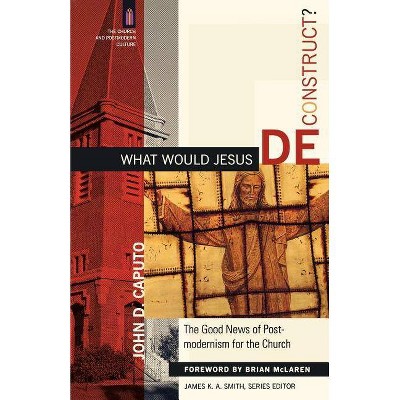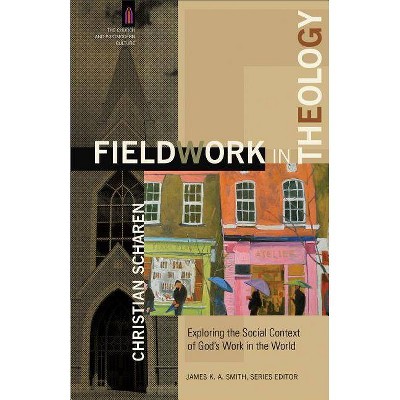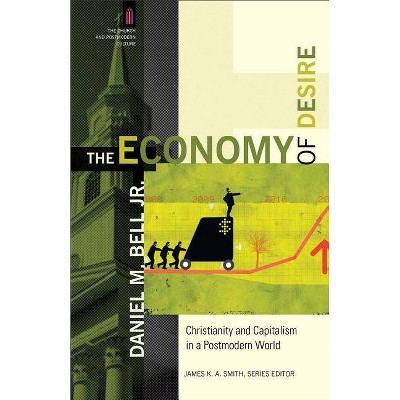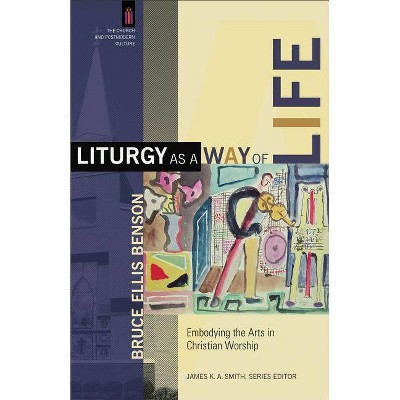What Would Jesus Deconstruct? - (Church and Postmodern Culture) by John D Caputo (Paperback)

Similar Products
Products of same category from the store
AllProduct info
<p/><br></br><p><b> About the Book </b></p></br></br>Uses the postmodern theme of deconstruction to suggest a constructive and provocative way forward for the church.<p/><br></br><p><b> Book Synopsis </b></p></br></br>This provocative addition to The Church and Postmodern Culture series offers a lively rereading of Charles Sheldon's<i> In His Steps </i>as a constructive way forward. John D. Caputo introduces the notion of why the church needs deconstruction, positively defines deconstruction's role in renewal, deconstructs idols of the church, and imagines the future of the church in addressing the practical implications of this for the church's life through liturgy, worship, preaching, and teaching. Students of philosophy, theology, religion, and ministry, as well as others interested in engaging postmodernism and the emerging church phenomenon, will welcome this provocative, non-technical work.<p/><br></br><p><b> From the Back Cover </b></p></br></br>Many in the church who are wrestling with ministry in a postmodern era view deconstruction as a negative aspect of the postmodern movement. But John Caputo, one of the leading philosophers of religion in America and a leading voice on religion and postmodernism, sees it differently. In this lively and provocative analysis, he argues that in his own way Jesus himself was a deconstructionist and that applying deconstruction to the church can be a positive move toward renewal.<br/><br/>"Caputo brilliantly manages to bring thought to life and life to thought. He wears his learning and scholarship so lightly that one has the impression of returning to a flesh-and-blood world where Jesus deconstructs and reconstructs our lives. Challenging, compassionate, witty, and wise. This book is compulsory reading for anyone concerned about the future of Christianity."<br/>--<b>Richard Kearney</b>, Charles Seelig Professor in Philosophy, Boston College<br/><br/>"Let this book settle the debate once and for all: postmodern philosophy does not preclude true Christian faith. In fact, taken rightly, postmodernism leads not to nihilistic relativism but to a robust faith in the Savior, who himself was bent on deconstruction. Caputo is a sheep in wolf's clothing."<br/>--<b>Tony Jones</b>, national coordinator of Emergent Village, author of <i>The New Christians: Dispatches from the Emergent Frontier<br/><br/></i>"This is a marvelous little book. It enables readers to understand deconstruction as the hermeneutics of the kingdom of God and provides a glimpse of what this concept might look like in the hands of Jesus as applied to the church. This will be difficult therapy, and many of us will be inclined to resist. However, let us remember that while discipline is painful in the moment, it produces a harvest of peace and righteousness in the long run. May the church learn from the wisdom found in these pages."<br/>--<b>John R. Franke</b>, professor of missional theology, Yellowstone Theological Institute<p/><br></br><p><b> About the Author </b></p></br></br>John D. Caputo (PhD, Bryn Mawr College) is Thomas J. Watson Professor of Religion and Humanities and professor of philosophy at Syracuse University. He is the author of numerous books, including "The Weakness of God" (winner of the 2007 AAR Award for Excellence in Constructive-Reflective Study of Religion), "On Religion," "The Prayers and Tears of Jacques Derrida," and "Deconstruction in a Nutshell: A Conversation with Jacques Derrida."
Price History
Price Archive shows prices from various stores, lets you see history and find the cheapest. There is no actual sale on the website. For all support, inquiry and suggestion messagescommunication@pricearchive.us




















